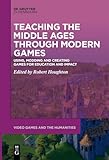Teaching the Middle Ages through Modern Games : Using, Modding and Creating Games for Education and Impact / ed. by Robert Houghton.
Material type: TextSeries: Video Games and the Humanities ; 11Publisher: München ; Wien : De Gruyter Oldenbourg, [2022]Copyright date: ©2022Description: 1 online resource (VII, 306 p.)Content type:
TextSeries: Video Games and the Humanities ; 11Publisher: München ; Wien : De Gruyter Oldenbourg, [2022]Copyright date: ©2022Description: 1 online resource (VII, 306 p.)Content type: - 9783110711967
- 9783110712117
- 9783110712032
- 940.10785
- online - DeGruyter
- Issued also in print.
| Item type | Current library | Call number | URL | Status | Notes | Barcode | |
|---|---|---|---|---|---|---|---|
 eBook
eBook
|
Biblioteca "Angelicum" Pont. Univ. S.Tommaso d'Aquino Nuvola online | online - DeGruyter (Browse shelf(Opens below)) | Online access | Not for loan (Accesso limitato) | Accesso per gli utenti autorizzati / Access for authorized users | (dgr)9783110712032 |
Frontmatter -- Acknowledgements -- Contents -- 1 Introduction: Teaching the Middle Ages through Modern Games -- Part I: The Educational Impact of Games -- 2 Learning About the Past Through Digital Play: History Students and Video Games -- Part II: Teaching through Commercial Games -- 3 Historicising Assassin’s Creed (2007): Crusader Medievalism, Historiography, and Digital Games for the Classroom -- 4 Declaiming Dragons: Empathy Learning and The Elder Scrolls in Teaching Medieval Rhetorical Schemes -- 5 “What if you are a Medieval Monarch?”: A Crusader Kings III Experience to Learn Medieval History -- Part III: Creating Educational Games -- 6 A Video Game for Byzantine History – Akritas: Playing at the Byzantine Borders -- 7 Collaborative Constructions: Designing High School History Curriculum with the Lost & Found Game Series -- 8 The Renaissance Marriage Game: A Simulation Game for Large Classes -- Part IV: User Modification as Learning Practice -- 9 Alchemy and Archives, Swords, Spells, and Castles: Medieval-modding Skyrim -- 10 Playing the Investiture Contest: Modding as Historical Debate in the Undergraduate and Postgraduate Classroom -- 11 Game Development in a Senior Seminar -- Part V: Games beyond the Classroom -- 12 The Soundscapes of the York Mystery Plays: Playing with Medieval Sonic Histories -- 13 Beyond Education and Impact: Games as Research Tools and Outputs -- List of Contributors -- Index
restricted access online access with authorization star
http://purl.org/coar/access_right/c_16ec
Games can act as invaluable tools for the teaching of the Middle Ages. The learning potential of physical and digital games is increasingly undeniable at every level of historical study. These games can provide a foundation of information through their stories and worlds. They can foster understanding of complex systems through their mechanics and rules. Their very nature requires the player to learn to progress. The educational power of games is particularly potent within the study of the Middle Ages. These games act as the first or most substantial introduction to the period for many students and can strongly influence their understanding of the era. Within the classroom, they can be deployed to introduce new and alien themes to students typically unfamiliar with the subject matter swiftly and effectively. They can foster an interest in and understanding of the medieval world through various innovative means and hence act as a key educational tool. This volume presents a series of essays addressing the practical use of games of all varieties as teaching tools within Medieval Studies and related fields. In doing so it provides examples of the use of games at pre-university, undergraduate, and postgraduate levels of study, and considers the application of commercial games, development of bespoke historical games, use of game design as a learning process, and use of games outside the classroom. As such, the book is a flexible and diverse pedagogical resource and its methods may be readily adapted to the teaching of different medieval themes or other periods of history.
Issued also in print.
Mode of access: Internet via World Wide Web.
In English.
Description based on online resource; title from PDF title page (publisher's Web site, viewed 02. Mai 2023)


